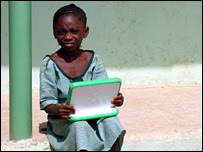 There is cute slideshow of children using the OLPC laptop in a Nigerian primary school here, along with a BBC news item and a bunch of features about the laptop and its introduction.
There is cute slideshow of children using the OLPC laptop in a Nigerian primary school here, along with a BBC news item and a bunch of features about the laptop and its introduction.I want one. Anyone interested in donating an XO to Development Entrepreneur News go here and order. For only $399 plus shipping you will make me happy, and also donate an XO to a school in the developing world. Wouldn't that be nice?
The One Laptop Per Child project hasn't been as successful so far as originally projected, partly because of a scramble by commercial computer makers to get similar machines into the market (as noted in this recent WSJ article). In particular Intel has created its own Classmate computer for the developing world (the XO uses AMD chips) and is promoting it aggressively. As one Nigerian consultant quoted in the WSJ piece said, "It's a no-brainer you go with Microsoft." (A version of Windows runs on the Classmate.)
Company founder Nicholas Negroponte professes to be philosophic about it: "From my point of view, if the world were to have 30 million" laptops made by competitors "in the hands of children at the end of next year, that to me would be a great success," he said in a recent interview. "My goal is not selling laptops. OLPC is not in the laptop business. It's in the education business."


